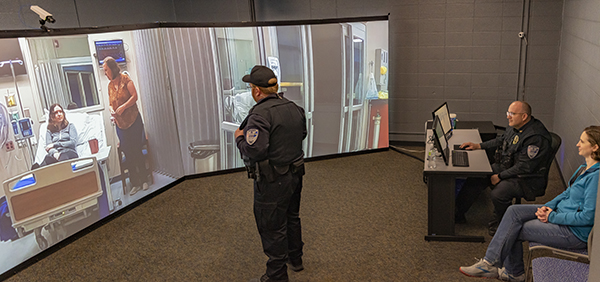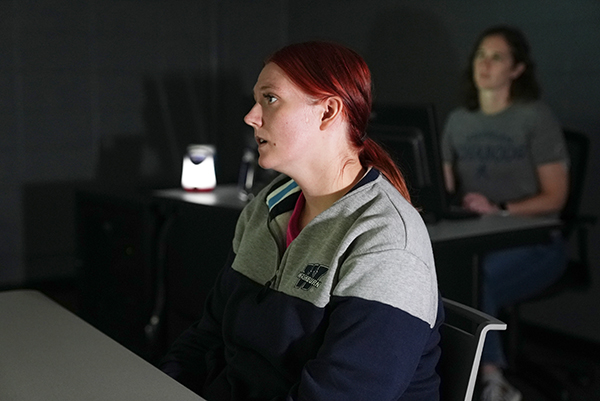Put Into Practice
New training simulator lets students, law enforcement officers practice decision making skills

(Chris Enos, bs ’16, chief, Washburn University Police Department, controls a scenario in the Virtual Training and Simulation Lab while Officer Austin Smith interacts and is watched by Melanie Worsley, jd ’07, associate dean, School of Applied Studies and professor, criminal justice and legal studies. Photo by Jeremy Wangler)
From The Ichabod - Spring 2023
By Jeremy Wangler
Julia Kofoid was responding to a homeless person trespassing on private property. With a police officer by her side, the social worker asked the citizen to leave, leading him to become agitated.
“I was telling him we have resources and if you come with me, I can get you temporary housing,” said Kofoid, bsw ’23. “As an officer, their role was more like, ‘This is unfortunately illegal. I understand you need some place to stay, but it can't be here.’”
At any moment, the situation could have turned aggressive. However, the danger was not real since this was a simulation on a screen in the social work class Ethics Workshop. Kofoid and her partner, a fellow social work major, played the roles of police officer and social worker while interacting with the scene.
“I was very nervous,” Kofoid said. “There were two faculty in the room watching us, picking up on things your mind isn’t because you’re just trying to go through the simulation and help your partner. They’re watching how you’re reacting, what wording you’re using, things like that.”
Students studying criminal justice, legal studies, social work and nursing are tested in controllable scenarios in the new Virtual Training and Simulation Lab in Henderson Learning Resources Center at Washburn University. The Washburn University Police Department and other law enforcement agencies also use it.
“You can learn from a professor and from textbooks, but when students actually get in and apply knowledge from the book to different situations in the simulator, a lightbulb clicks in their head,” said Scott Sainato, assistant professor, social work, who will teach Ethics Workshop this fall. “The simulator allows students to practice essential skills such as engagement, assessment and problem solving. It provides an interactive approach for applying classroom knowledge to real-life scenarios they may encounter.”
Chris Enos, bs ’16, chief, WUPD, runs his officers through simulations about once a year as part of their regular training. He also uses the simulator to demonstrate police procedures to the public, including members of community organizations.
“There's so much nuance when it comes to police using force,” Enos said. “It's hard to describe those nuances unless you experience it and have to make those decisions yourself. And we like to have the Washburn executive staff go through it because they oversee the police department. It's important they understand what that means, especially when it comes to use of force.”
The simulator can sense if a participant uses the provided decoy weapons including pepper spray, stun guns or firearms. While use of force is possible in every scenario, it doesn’t come into play often with Enos – but there’s always a chance. Decision making and communication are the focus instead.
“The vast majority of the time, our officers never deploy their firearms or use force in simulations because the vast majority of calls we go on, we never have to use force,” Enos said. “In life and death decisions, you get so focused on the decisions that you lose track of the people. If we can put officers in an environment to practice making those decisions while still communicating as a human and not a robot, those are good things.”
“Giving officers the opportunity to practice decision making, communication and de-escalating skills can lead to better outcomes,” said Melanie Worsley, jd ,07, associate dean, School of Applied Studies and professor, criminal justice and legal studies.
And it allows the instructor to coach the participants on the spot.
“We can hit pause and say, ‘Maybe that wasn't the best thing to say,’” Enos said. “And then we hit play and go through it again.”
The discussions afterward can be just as valuable.
“In classes, we've been able to talk about larger issues regarding criminal justice,” Worsley said. “I like the multifaceted approach you can take with it in terms of very practical, hands-on skills and within a larger, educational environment where you can talk about how society addresses homeless issues and similar things; how are our biases and our own histories influence how we're interacting with people.”

(Melanie Worsley watches criminal justice student Kylie Hawes participate in a simulation. Photo by Morganne Lander)
In the Quality and Safety in Healthcare nursing class, Samantha Lawrence, bsn ’23, interacted in the simulator with an agitated mother who felt hospital staff weren’t treating her daughter quickly enough.
“It gave us a safe environment to approach something we will most likely see, and we were able to come up with something good to say without making a patient's parent mad,” Lawrence said. “You can learn without consequences if you say the wrong thing.”
Kofoid, who is entering Washburn’s master of social work program, hopes the simulator’s use will spread.
“I think it would be very helpful to work across majors because that is becoming the case in the real world,” Kofoid said. “Social workers and police officers are starting to team up more and it's very needed to have those kinds of connections. My specific scenario helped me engage as a social worker and understand what a police officer has to do, what their commitments are versus my ethical obligations.”